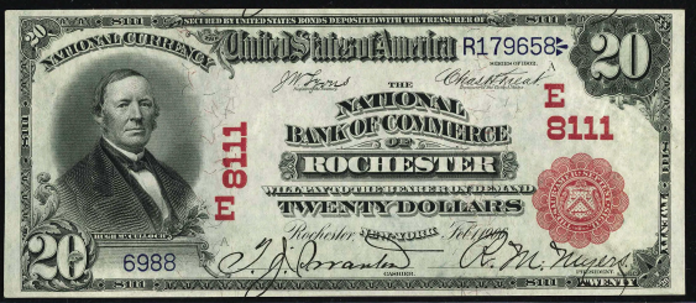Twenty Dollar Notes › Nationals › 1902 Twenty Dollar National Bank Notes › Ohio Charters › 1902 $20 Ripley Ohio Citizens National Bank
Get Value Now
| Item | Info |
|---|---|
| Series | 1902 |
| Charter | #3291 Citizens' National Bank of Ripley, Ohio |
| Year Chartered | 1885, 146 Banks Chartered |
| City Info | Ripley is a village in Brown County, Ohio, United States, along the Ohio River 50 miles southeast of Cincinnati. The population was 1,750 at the 2010 census. Colonel James Poage, a veteran of the American Revolution, arrived in the free state of Ohio from Staunton, Virginia in 1804 to claim the 1,000 acres he had been granted in what was called the Virginia Military District. Poage was among a large group of veterans who received land grants in what was first organized as the Northwest Territory north of the Ohio River for their service in the American Revolutionary War, and freed their slaves when they settled there. Poage and his family laid out the town of Staunton in 1812; it was renamed in 1816 to honor General Eleazar Wheelock Ripley, an American officer of the War of 1812. Source: Wikipedia |
| Similar Cities | If your note doesn't match try: 1. Ripley, Ohio - First National Bank 2. Ripley, Ohio - Farmers' National Bank 3. Ripley, Ohio - Ripley National Bank 4. Ripley, New York - First National Bank 5. Ripley, Mississippi - First National Bank 6. Ripley, Tennessee - First National Bank 7. Ripley, West Virginia - First National Bank |
| Seal Varieties | Red, Blue |
| See Also | If your note doesn't match try: 1. 1905 $20 Gold Certificate 2. 1906 $20 Gold Certificate |
| Other Info | 1. Value depends on notes known for charter, condition and market demand. |
| Neat Fact | Portrait of Hugh Mculloch, comptroller of Currency, 1863-1865; Secretary of Treasury 1865-1869 & 1884-1885. |
No Obligations Offers and Appraisals
Please submit a good photo or scan. It will be identified and evaluated. Understand there may be subtle differences between the image you see above and your note. Signatures, design, markings and note condition will determine the offer price. Notes in Uncirculated or better condition receive the best offers.
Appraisals can be estimated for wholesale and retail prices. Wholesale is what dealers typically pay. Retail is what a collector might pay. Retail is slightly higher in most cases.
Please visit this page for USA Paper Money Reference. Do not treat this page as a reference guide, it is for appraisal and acquisition purposes only.
